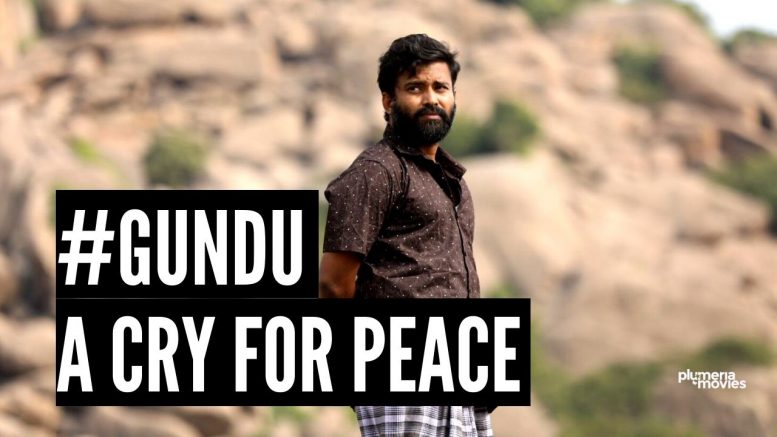Athiyan Athirai’s debut feature Gundu, an intriguing drama with its sturdy personality and striking politics is a cry for peace. The calming gushes of the sea waves we hear are immediately replaced by the metallic clangour rising from a scrapyard. A heavy, pipe-like metal structure washed ashore by the waves finds itself in the scrapyard with other shipwreck. This too is a wreckage of the past, the ruthlessness of which lies wired inside, ready to explode when hit by the rage of fire. Years beneath the vast silent ocean hasn’t calmed it yet. It has arrived in a country with no direct ties to the Second World War, an enslaved nation used as the dumping ground, the scrapyard indeed for dirty secrets and bloody weapons. The struggling, developing, ambitious country, indebted to its father, the man of peace bears the brunt of the vain vicious power struggle between the affluent nations of then. The resonance of the same including the affection with the father is found in the central character of the film too.
The film initially establishes this broader stroke prior delving into the personal journeys, the travails of a labourer, of lovers and a comrade, which serve as the window to the world, its (mis)conceptions about security, status quo, heaven and the gods. The broader aspects of the film’s inclination extend to the roots of these journeys, in what pushes them and draws them apart. The title unfolds in the sabotaged landscape of a post-apocalyptic world, a hell with dense ashes rising from the explosions, engulfing the lifeless world in its heavy grey, as the missiles rain down on the ruins. There is a strong sense of caution inherent in the above image- this shall be our doom if we fail to let love and equality vanquish the brutal quest of violence. This doesn’t land as a threat of a distant dystopia but a powerful warning of the reality for we have risen from these ashes and might consumed again.
The bomb, the gundu lands with Selvam, a labourer who goes about his job with an incredible passion. This is a part of the world absorbed in its own worries, struggles and social politics, removed from the blatant horror of the world’s wars. When a frustrated cop asks his subordinates if they had ever seen a bomb at all and instructs them to draw it, the policemen sketch apple like structures stating with evil naivety, ‘gundu gundaa thaan irukum’. Now the bomb is in our shores, our streets and our shoulders.
The first time we see the scrapyard Selvam works in, the truck’s doors open his world to us and the ever-burning fire in the yard, their hearts, hardworking wounded bodies and dreams. The koothu, a small celebration among the labourers is propelled by the spirit of rebellion, the promises of tomorrow and the positive changes unfolding in the present. This theme is strongly recurrent in all the effective songs of the film, musically elevating the undercurrents and the ultimate core, which here is the philosophy of peace and the battles to arrive at this world of benevolence.
Selvam’s portrayal owns dignity starting from his inspirations and aspirations in the job to his drive to prevent the tragedy. He is a fine romantic when he tells Chitra that he is never alone during the long drives in the lorry, his mind is always in a conversation with the stretching clouds, the stars, his dad and her. Dinesh embodies Selvam’s angst, innocence and drive with an energy both adequate and organic. When he talks to Chitra of his world, his ambitions, calling out the prejudices of the hypocritical society, he is captured singular in the frame and his gaze is almost directed right at us. This enables the rightful perspectives of his finely linked to the film’s pursuit land where it ought to.

What is remarkable is that in these brief interactions, a connection is established which rings personal and this comes to our aid when the film trails off prior returning sharp, on point. The film pursues the story of love binding him to Chitra which is resisted by her status conscious family. In a film which bears the potential sturdy tone of a thriller, one might argue that these love scenes are quite distracting. The tale strives to be more than a finely made thriller as it reveals its course in expounding the virtue of peace and the futility of violence.
It is with the Selvam -Chitra love story that the film touches on the divisive lines running along the modern world, constantly threatening love with death as gods themselves stand witness. Their love story gets a dream sequence too. However, it is not set in relatively exotic places or boisterous circumstances as it flows as a blend of dreams and memories bearing the melancholy of the past’s haunts and the melody of the future. Maavuli, the song which opens as a rebellious one, about a warrior, breaks into romance, returning to the rebellion with more might. The love is where the strength and the light to fight the darkness is derived. And what better aspect than love to exude peace, as Jim Hendrix observes, ‘When the power of love overcomes the love of power, the world will know peace.’
In the glorious Iruchi song, celebrating the rage of the goddess, it is actually Chitra who is adored for her vehement departure from her home and its prejudices. She doesn’t stealthily slip away from her backyard, she walks through her front door, head held high, throwing in a heroic slap as the music revels in the glory of the moment, the lyrics honouring the power of her action as a woman of grit and as the breaker of the society’s crude chains. It is stunning that in this song which intercuts between her departure and the dance of the enraged goddess, the former feeds stirring energy to the latter, giving it meaning, relevance and broader inspiration.
The propelling and promising aspects of communism borne and built by Tanya enable the channelisation of the angst and dreams besides driving the points of the plot and providing a concrete closure to the tale. The social aspects to the tale are many and add up to substantial dimensions and the film is triumphant as it engages and works out in all the levels, broader and beyond. The film’s inductive shift, its movement from the personal journeys to its larger sphere unfolds with the least hassle. It is meant to head there and it does, emerging as a personal, political and philosophical meditation on peace, conveying its ardent desire for a world of no wars. As the Thalaimurai song flows with the credits, lines from Neruda’s Keeping Quiet resound in the heart,
“Those who prepare green wars,
Wars with gas, wars with fire,
Victories with no survivors,
Would put on clean clothes
And walk about with their brothers
In the shade…”



Be the first to comment on "Gundu (Review): A cry for peace. An intriguing drama"